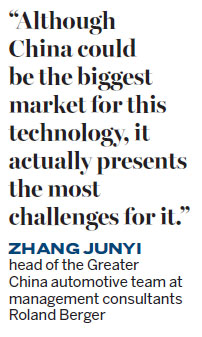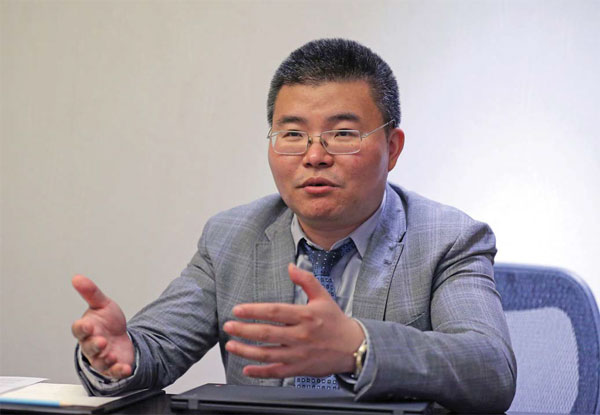Biggest market presents the most challenges

Auto expert believes autonomous car technology will mature by 2030, but legal framework will be an issue
Leading automotive technology expert Zhang Junyi believes it could be 100 years before driverless cars finally take over the roads.
The head of the Greater China automotive team at management consultants Roland Berger insists the technology can work properly only when robots become more reliable than humans.
| Zhang Junyi, head of the Greater China automotive team at management consultants Roland Berger, says the automotive technology can work properly only when robots become more reliable than humans. Wang Zhuangfei / China Daily |
"That is the trigger point we have to reach. I think it will be at least 50 years, but it could also be 100 years before that occurs. It will happen, however. It will definitely happen," he says.
The 38-year-old, who is regarded as one of China's top authorities on the new technology, was speaking in a meeting room at the Sheraton Hotel in Beijing.
His views have been much in demand after recent excitement about autonomous cars at the Beijing Auto Show in the spring and the Consumer Electronics Show in Shanghai in May.
China is set to be the world's largest market for driverless cars, with Boston Consulting Group recently forecasting that it could make up one-fourth of the global market of 12 million by 2035.
A Roland Berger survey found that 96 percent of Chinese would be prepared to use an autonomous vehicle, compared with 58 percent in the United States.
"The Chinese are willing to ride in a driverless car, although that does not necessarily mean buy one," Zhang says.
"Although China could be the biggest market for this technology, it actually presents the most challenges for it. Driving in China can be somewhat chaotic. It is not pure driving. You have so many obstacles on the road, from animals, bicycles and carts. In Germany, you are just talking about not crashing into another car, not all of these other things."
Zhang says there is a great amount of confusion about what constitutes a driverless car, with people not realizing it is an evolutionary process.
According to US automotive standards body, the Society of Automotive Engineers, there are five levels of autonomous car, ranging from one, where there is some driver assistance, to five, where a vehicle completely drives itself.
Mercedes' new E-Class L, which was recently launched, is in the two or three category and has functions such as helping the driver brake as well as changing lanes and maintaining a safe distance from the vehicle ahead.
"All the big car manufacturers will have launched a level three autonomous car by 2020. This will be the sort of car that can stop automatically, follow the road lanes, and that kind of thing.

"The technology itself will mature around 2030, when we will achieve level five, but the main problem is not the technology but the overall environment where the cars can be used."
Zhang says the biggest challenge is the legal framework in which they operate. At present, it is the driver of a car that is usually responsible in the event of an accident. If a car had no steering wheel, that responsibility could fall on the vehicle manufacturer.
"This is the most difficult test actually. If you have a steering wheel the responsibility is down to the driver. If you do not have any interaction with the system or any screen, it all boils down to the carmaker. It is a very difficult and, in fact, weird area."
Zhang says with internet giants Google and Baidu entering the market, one of the major questions is whether driverless cars are the product of new technology companies or still very much the territory of the automotive industry.
"This is always the debate. Do we need very accurate map technology as provided by companies such as Google or do we just need a smart car? The answer is that you need both technologies."
Leaders in the technology are Mobileye, a company formed in Jerusalem in 1999 that makes advanced driver assistance systems; Nokia, which produces the Here mapping technology; and Google, whose Google Maps are not available in China.
Although there is a lot of excitement about Google entering the autonomous-car market, Zhang is not so impressed.
"What Google is thinking of a is a low-speed car that will do about 40 km/h and not one for the highway. That sort of speed would only allow it to be used on a campus or some similar place."
One of the most famous collaborations in China is between Baidu and BMW.
The automotive expert believes the arrangement suits the German car company since it will give it access to a vital market.
"BMW has a number of options. It can do everything itself because it has this 100 years of expertise or it can collaborate with car competitors or technology companies. It is attracted to working with Baidu because China is potentially the largest market for this technology, and also might come up with a particular technology to deal with the problem of driving in China."
Zhang, who is from Shanghai, studied economics at Fudan University and then did a master's in automotive engineering at Tongji University, both in Shanghai.
After an internship at insurance giant Allianz's technology center in Munich, where research is done on damaged vehicles, Zhang joined management consultants Roland Berger in Shanghai in 2004.
Although he later left the company to join consultants Arthur D. Little for two years, he returned as head of Berger's Greater China auto and private equity practice in 2008. He is now also a vice-president.
"This is the largest such automotive practice in China. It is a very interesting sector to be involved in as the auto industry has a very wide reach. It covers a lot of areas, including automotive engineering, research and development, sales and marketing, and issues around mobility and e-commerce."
With so much activity going on in autonomous cars in the country, some expect China to become more of a leader in this area than with traditional vehicles where it has been very much a follower, particularly in cars over 1,600 cc.
"It is a catch-up process. China has just 30 to 40 years of car manufacturing experience, where the major manufacturers have 100 years or more.
"I don't think we should see this as a complete game-changer for China and it suddenly becoming a leader because you still need automotive technology to succeed in this area."
Zhang believes Chinese car manufacturers will continue to collaborate with other car companies and with technology firms.
"China can't do this alone, so the various companies will look to integrate their technologies, build up research and development facilities overseas and work with others."
He believes the country does have one advantage in that it is able to designate large areas of its cities as testing areas for autonomous vehicles. One such is Autocity in Shanghai, a 68-sq-km area on the outskirts of the city.
"This is not easy to do in many other countries. We have the largest playground for all the players to test out their cars. Many of the car majors already go to Shanghai, in particular, to test their cars."
andrewmoody@chinadaily.com.cn
(China Daily European Weekly 06/24/2016 page8)
Today's Top News
- Takaichi must stop rubbing salt in wounds, retract Taiwan remarks
- Millions vie for civil service jobs
- Chinese landmark trade corridor handles over 5m TEUs
- China holds first national civil service exam since raising eligibility age cap
- Xi's article on CPC self-reform to be published
- Xi stresses improving long-term mechanisms for cyberspace governance































